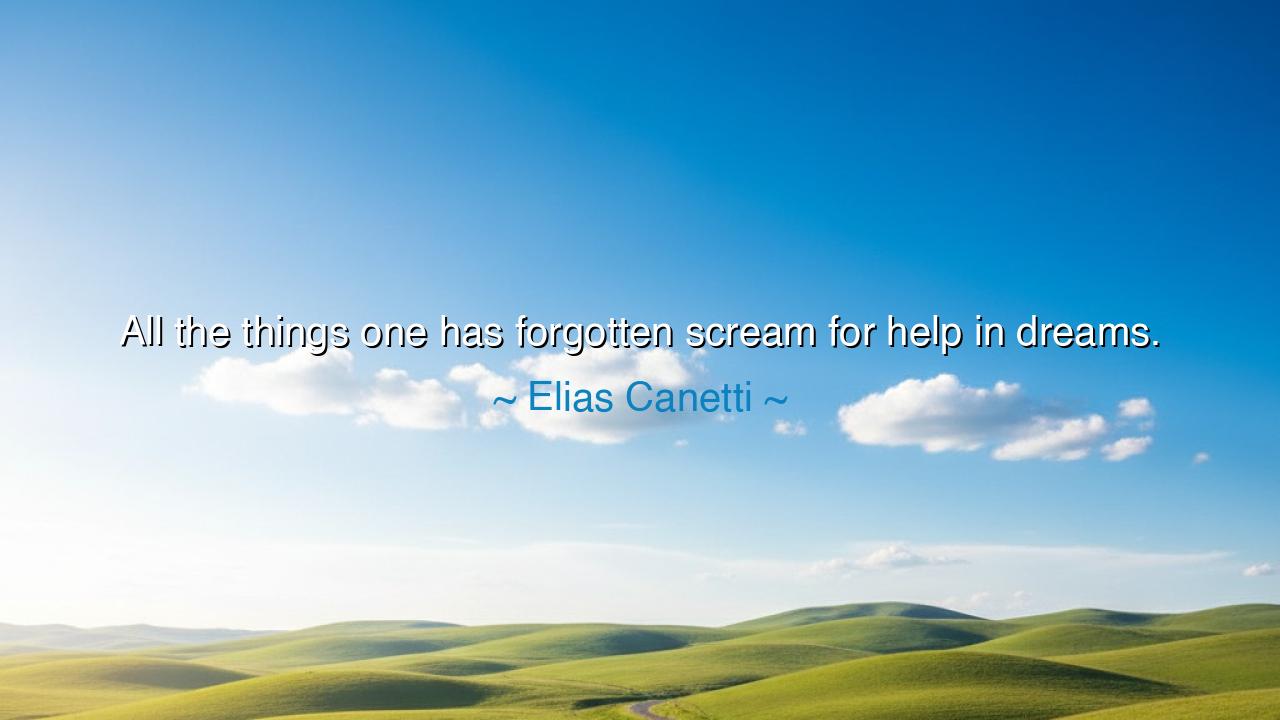
All the things one has forgotten scream for help in dreams.






“All the things one has forgotten scream for help in dreams.” Thus spoke Elias Canetti, the observer of souls, who saw not only the surface of man but the deep chambers beneath his silence. In these words lies a truth as ancient as humanity itself — that the unremembered, the buried, and the denied within us never truly die. They live in the shadows of the mind, waiting, watching, whispering. And when we sleep — when the guard of reason lays down its sword — they rise and cry out, demanding to be seen, to be healed, to be remembered.
The dream is no idle fancy. It is the voice of the forgotten self, the echo of what the waking mind has cast aside. The ancients knew this — the Greeks built temples to Asclepius, where the sick and troubled would sleep and await divine visions that revealed the cause of their suffering. For they believed that dreams were messages from within, the soul’s attempt to restore harmony. Canetti, in his wisdom, reminds us that the mind, too, seeks balance — and when imbalance grows through neglect or repression, our dreams become cries of memory in distress.
Consider the story of Carl Jung, the great explorer of the unconscious. For years he studied dreams, believing them to be the key to the labyrinth of the psyche. Once, during a time of inner turmoil, Jung dreamt of a great flood engulfing Europe, washing away cities and lives. When he awoke, he felt the weight of an approaching storm — not of weather, but of history. Months later, the First World War erupted. Jung understood then that dreams speak not only for the individual soul, but sometimes for the collective, where all forgotten anguish of mankind gathers. The dreams were not madness — they were warnings, the heart’s cry before the breaking of the world.
Each of us carries forgotten things: a promise unkept, a grief unspoken, a fear unacknowledged. These are not lost — they are sealed away, deep beneath the noise of our days. But when night comes, and we can no longer hide from ourselves, these ghosts stir. They speak in symbols — a lost house, a crying child, a darkened path. They are not to be feared, for they are parts of us, seeking release, longing to be known. The wise do not flee from such dreams; they listen, they interpret, they reconcile. For in facing the forgotten, the soul grows whole again.
Dreams, then, are the language of the hidden self. To ignore them is to ignore one’s own heart. They reveal where healing is needed, where truth has been buried. The one who attends to their dreams learns to walk in deeper awareness — awake both by day and by night. The ancients would rise at dawn and record their visions, believing that by naming what was seen in sleep, they could reclaim what was lost. So should we. For the forgotten that is remembered no longer needs to scream.
The screaming Canetti speaks of is not a punishment — it is mercy. It is the soul refusing to be abandoned by the forgetful mind. Like a child calling out to its parent, the dream cries, “Do not forget me.” To hear that cry is to begin the sacred work of integration — to gather the scattered fragments of oneself into unity. The ancients called this process the alchemy of the soul — the transformation of darkness into understanding.
Let this be the teaching, then: do not flee from your dreams. Do not treat them as illusions, but as guides. Each night, the forgotten parts of you reach upward, asking to be seen. When you awaken, write them down. Reflect upon them. Ask what in your life has gone unheard, unloved, unresolved. For to listen to your dreams is to listen to your own eternity.
And remember this truth, O seeker of light: the forgotten never cease to exist — they wait. They wait until you are still enough, brave enough, tender enough to hear their voice. When you do, the screaming ceases, and in its place comes peace — the peace of a self made whole, the silence that follows understanding, the dawn that follows the long, deep night.






AAdministratorAdministrator
Welcome, honored guests. Please leave a comment, we will respond soon